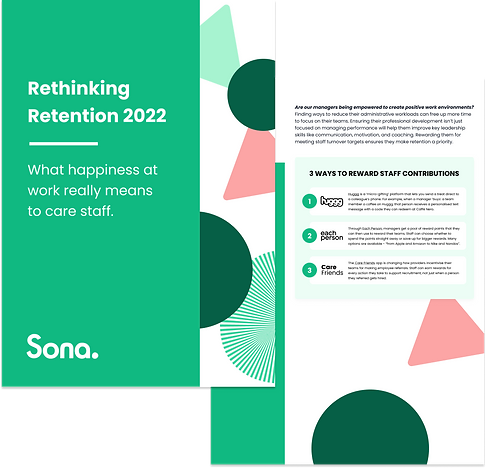New partnership announced with Borderless
Sona and Borderless announce an exciting partnership.
Building a staff schedule couldn’t be easier.
Reduce payroll errors with real-time T&A.
Fill 50% more shifts with your own employees.
Ensure shifts are covered even if you're understaffed.
Manage absence requests and approvals.

Practical ways to boost team morale with proven examples from across the sector.

Find out what care employees say matters to them most at work.
Search and view employees with customised permission levels.
Key employment information all in one place.
Store visas, professional certifications and more with easy access.
Control personal and operational details of your staff.

Why are people leaving Social Care, and where are they going?

We asked 250 Social Care leaders about their attitudes towards digitisation and their plans for the next 12 months...

Why are Hospitality workers leaving the industry, and what can you do to retain them?
Share updates with a single click.

Staff can see relevant messages in one place.
Request post-shift feedback from staff.
Recognise staff contributions by sending them praise.
Identify staff at risk of churning.

How care organisations can embrace flexible working and thrive.
Maintain quality of care and reduce costs.
Maximise profitability through AI-powered forecasting & scheduling.
Elevate your operational efficiency and guest satisfaction.
Streamline operations across sites.
Developed alongside Social Care experts with decades of combined experience.
See why we are the leading user-friendly, end-to-end platform that prioritises both efficiency and wellbeing.
The Sona Partner Network is an ecosystem of solution experts and complementary technologies.

Give staff greater visibility of shifts available to work, with a simple "shift claim" process to increase their income.
Improve employee engagement and retention with a seamless employee communication platform.
Happier staff provide greater customer experiences, which in turn drives return rates, revenues and recommendations.

Give staff greater visibility of shifts available to work, with a simple "shift claim" process to increase their income.
Improve employee engagement and retention with a seamless employee communication platform.
Happier staff provide greater customer experiences, which in turn drives return rates, revenues and recommendations.

Meet the Sona team online with our webinar series or in-person at an event near you.
New research, insights, and strategies for frontline leaders.
Downloadable templates, reports and guides from Sona.
Stay up to date with the latest Sona news and research.
Learn how our customers are transforming their people operations.
| 3 min read
Sona and Borderless announce an exciting partnership.
| 2 min read
Sona and Found by Lottie announce an exciting partnership.
| 4 min read
Remove operational errors, drive efficiency, and help your team spend less time on admin with a unified solution.
PUBLISHED: February 2025
Download the report to learn how hospitality operators are embracing AI challenges and opportunities in 2025.
PUBLISHED: January 2025
Reveal the most important metrics in 2025!
PUBLISHED: December 2024
This infosheet is packed with practical insights to drive high-quality, low-regret WFM purchases.The average staff turnover rate in UK Social Care can often exceed 30%. With the well-being of vulnerable individuals at stake, maintaining a stable and dedicated workforce is paramount. In this comprehensive guide, we cover the vital role of employee retention and best practices for keeping more of your staff for longer.
Retention in Social Care refers to the ability to maintain staff within an organisation or agency providing care services.
This includes preventing staff turnover and keeping experienced and skilled employees within the organisation. High staff retention can lead to better continuity of care for clients, improved relationships between staff and clients, and increased efficiency within the organisation.
Factors that can impact retention in Social Care include job satisfaction, pay and benefits, opportunities for professional development, and supportive management.
Key employee retention strategies include:
Offer competitive salaries and benefits: Attract and retain staff by offering competitive salaries and benefits that are comparable to other industries.
Provide ongoing training and development opportunities: Invest in training programs that will help staff develop new skills and advance in their careers.
Foster a positive work culture: Create a positive and supportive work environment that values and recognises staff contributions.
Promote a healthy work-life balance: Allow staff to have flexible schedules and time off when needed to reduce burnout and improve employee satisfaction.
Improve communication and transparency: Ensure open and transparent communication between staff and management to build trust and foster a sense of community.
Recognise and reward good performance: Reward staff members for good performance, such as bonuses or promotions, to encourage them to stay with the organisation.
Provide support to staff dealing with stress and burnout: Create a support network for staff dealing with stress and burnout, such as counselling or mental health services.
Staff turnover in Social Care is a persistent issue that affects organisations and their clients. There are several reasons for this, including low wages, lack of support, and inadequate training opportunities.
One of the most significant reasons for staff turnover is low wages. Many Social Care workers are not paid enough for the demanding and emotional work they do. This can lead to burnout and high turnover, as workers seek better-paying jobs elsewhere.
Another reason for staff turnover is the lack of support from the organisation. Many Social Care workers feel overworked and undervalued, which can lead to feelings of burnout and low morale. This lack of support can also lead to high turnover, as workers look for organisations that provide more support and appreciation for their hard work.
Inadequate training opportunities are another reason for staff turnover. Social Care workers often need to learn new skills and techniques to keep up with changing client needs and trends. If organisations do not provide adequate training opportunities, workers may feel frustrated and unable to progress in their careers. This can lead to high turnover, as workers look for organisations that offer more opportunities for professional development.
Lack of work-life balance is another common complaint. In our research for our Flex Appeal report, 58% of care employees said they don't believe work-life balance exists in the sector. Greater flexibility is the second most influential reason people leave care to work in another industry.
Finally, poor working conditions and a lack of job security can also contribute to high staff turnover in Social Care. Workers may feel stressed and anxious about the security of their jobs, leading to high turnover rates.
In conclusion, low wages, lack of support, inadequate training opportunities, poor working conditions, and a lack of job security are some of the main reasons for staff turnover in Social Care. Organisations need to address these issues to retain their workforce and provide the best possible care for their clients.
Offer competitive salary and benefits: Provide a fair and attractive compensation package that reflects their experience and value to the organisation.
Professional Development Opportunities: Offer training and development programs to help employees grow and improve their skills.
Supportive work environment: Create a positive and supportive work environment that values and appreciates the contributions of staff.
Recognition and rewards: Recognise and reward employees for their hard work and contributions. This can include bonuses, promotions, and other incentives.
Flexibility: Offer flexible working arrangements, such as flexible hours and remote work options, to accommodate employees’ personal and family needs.
Good management: Ensure that employees have access to effective leadership and support from their supervisors and managers.
Employee engagement: Foster a sense of engagement and empowerment by involving staff in decision-making processes and encouraging open communication.
Employee benefits: Offer employee benefits such as health insurance, paid time off, and retirement savings plans to help employees feel secure and valued.
Here are some of the key benefits of high retention rates in Social Care:
High retention rates result in a stable and consistent care team, which allows for more effective and meaningful relationships to develop between staff and clients. This leads to better quality of care for the individuals being supported.
When staff members are familiar with the individuals they are caring for, they can quickly and effectively respond to their needs, reducing the time and effort required to provide care.
A stable care team can contribute to better health outcomes for the individuals being supported, as they are more likely to receive consistent and effective care.
High staff retention can also have a positive impact on the morale of both staff and clients. When staff are satisfied with their job, they are more likely to be engaged and motivated, which can result in a more positive working environment.
High staff retention can also reduce costs associated with training and recruitment, as there is less turnover of staff and fewer new hires to train.
A high retention rate can be seen as a sign of a well-run organisation, which can improve the reputation of the Social Care provider and attract new clients and staff.
A positive work culture is essential in retaining employees in the Social Care industry, where high levels of job stress, burnout, and low job satisfaction are common. A supportive work environment not only improves morale but also improves providers' ability to retain employees and increases productivity. Here are a few ways to create a positive work culture in Social Care:
Acknowledge and reward the hard work of your staff members regularly. This can be done through bonuses, gift cards, or public recognition during team meetings.
Encourage open communication between employees and management, allowing for open dialogue and discussion. This creates a sense of unity and collaboration among team members.
Involve staff members in decision-making processes and provide them with opportunities for professional growth and development. This shows them that their opinions matter and that their growth is important to the company.
Offer flexible scheduling to accommodate employees' needs and schedules. This can lead to a better work-life balance and reduce stress levels.
Encourage collaboration and teamwork, creating a supportive and inclusive work environment. This can improve overall morale and reduce stress levels.
In conclusion, creating a positive work culture in Social Care can have a significant impact on employee retention and satisfaction, and overall productivity. By taking small steps to create a supportive and inclusive work environment, Social Care organisations can ensure that they have happy and engaged employees who are motivated to do their best work.
Employee engagement is critical in the Social Care sector, as it has a direct impact on the quality of care provided to clients. When employees are engaged, they are more committed to their work, more likely to provide high-quality care, and more invested in the success of the organisation.
Engaged employees are also more likely to stay with the organisation for the long term, reducing turnover rates and improving continuity of care for clients. This is especially important in Social Care, where clients often have complex needs and require consistent and reliable support.
In addition to improving the quality of care and reducing turnover, staff engagement can also lead to higher levels of job satisfaction and overall well-being among employees. Engaged employees are more likely to feel valued and supported, which can have a positive impact on their mental health and well-being.
Effective communication is a key component of employee engagement in social care. Employees need to feel that their input is valued, and that they have a say in decision-making processes that affect their work. Regular feedback, recognition and opportunities for development and growth are also important factors in engaging employees.
Overall, employee engagement is crucial in social care, as it has a direct impact on the quality of care provided to clients, as well as on employee well-being and retention. Social care organizations should prioritize employee engagement initiatives to ensure the long-term success of their operations and the well-being of their clients and employees.
Employee retention in the Social Care sector is essential for providing continuity of care and ensuring the highest standards are met. One of the most effective ways to retain staff is to provide appropriate training and development opportunities. Here are some key steps to consider:
Conduct regular appraisals to understand the training needs of staff and the areas where they require additional support. This will ensure that the training and development opportunities provided are relevant and beneficial to their role.
Create an environment where staff are encouraged to continuously learn and develop their skills. This can be achieved through regular in-house training sessions, attending conferences and workshops, and online courses.
Foster a supportive and positive working environment where staff feel valued and appreciated. Encourage staff to take advantage of training opportunities and provide support and guidance when required.
Offer opportunities for career progression and encourage staff to take on new challenges and responsibilities. This will help to keep staff motivated and engaged in their work.
Regularly evaluate the impact of training and development opportunities to ensure they are meeting the needs of staff and making a positive contribution to their roles.
By providing appropriate training and development opportunities, Social Care organisations can support their staff in developing the necessary skills and knowledge to provide the highest standard of care. This, in turn, will lead to increased job satisfaction and a reduction in staff turnover.
The UK Social Care sector is facing a funding crisis, with inadequate funding leading to increasing pressure on local authorities and providers to reduce costs. This has resulted in widespread cuts to Social Care services and continued low pay for care workers. The low pay for care workers has long been a source of concern, with many care workers earning below the minimum wage and struggling to make ends meet. This has contributed to high turnover rates, with many care workers leaving the sector for better-paying jobs.
The government has attempted to address the funding crisis by implementing the Better Care Fund, which pools resources from the NHS and local authorities to provide more integrated care services. However, critics argue that this is not enough to address the funding shortfall and that more radical solutions are needed, such as a dedicated Social Care tax or a National Care Service.
The ongoing debate around funding for Social Care has serious consequences for care workers, who are already underpaid and overworked. Inadequate funding and cuts to services will lead to even lower pay, longer hours, and increased workloads for care workers. This in turn will lead to further stress and burnout, and a decrease in the quality of care provided to those who need it most.
In conclusion, the funding crisis in UK Social Care and its impact on care workers highlights the need for a comprehensive solution to address the shortfall in funding and ensure that care workers are paid a fair wage for their vital work. This will not only benefit care workers but also ensure that those in need receive the high-quality care they deserve.
Measuring and tracking employee retention is crucial for Social Care employers to ensure that they are retaining their most valuable employees and to identify areas where they need to improve. Employee retention is the extent to which employees remain in an organisation over time and is a key indicator of the health and stability of an organisation. Social Care employers can measure and track employee retention by implementing the following methods:
Surveys - Employee surveys are a great way to gauge the level of employee engagement and to identify areas where improvements need to be made. These surveys can be done annually or bi-annually and should include questions related to job satisfaction, opportunities for career development, and overall workplace culture.
Exit interviews - Exit interviews are an excellent way to gather data on why employees are leaving the organisation. This information can help employers identify trends and areas that need improvement to help increase employee retention.
Turnover rate - This is the percentage of employees who leave the organisation over a given period of time. A high turnover rate is a red flag that there may be issues with the workplace culture or opportunities for growth and development.
Employee retention rates - Tracking the length of time employees remain with the organisation is a key indicator of employee retention. Social Care employers should aim for high employee retention rates, as this is an indicator of a positive workplace culture and a satisfied workforce.
By tracking and measuring employee retention, Social Care employers can take proactive steps to improve their workplace culture, support employee growth, and retain their most valuable employees.
Good supervision and support in Social Care is crucial in retaining staff and maintaining a positive work environment. Providing regular feedback and recognition to staff members can improve morale and job satisfaction.
Also, providing opportunities for career development and training helps staff members feel valued and invested in their work.
A supportive and encouraging manager can also help to alleviate stress and workload pressures, reducing the likelihood of staff burnout and turnover. It is important to address any concerns or issues that staff members may have and to provide them with the tools and resources they need to succeed in their roles.
Overall, good supervision and support create a positive work culture and promote employee retention in Social Care.
Here two examples of best practice:
Implementing a mentoring or coaching program for Social Care employees can have a variety of benefits for both the employees and the organisation. One of the primary benefits is increased employee retention. When employees feel supported and invested in by their organisation, they are more likely to stay with the organisation for the long term. Mentoring and coaching programs provide employees with peer-to-peer learning and career development opportunities, which can help to increase employee satisfaction and reduce turnover.
Mentoring and coaching programs can also help to improve the quality of care provided to clients. By providing employees with guidance and support, they can develop their skills and knowledge, which can ultimately lead to better outcomes for clients. In addition, mentoring and coaching programs can help to foster a culture of learning and continuous improvement within the organisation.
Another benefit of mentoring and coaching programs is that they can help to identify and develop future leaders within the organisation. By providing employees with opportunities to take on leadership roles and develop their management skills, the organisation can build a pipeline of talent to support its long-term growth and success.
Overall, implementing a mentoring or coaching program for Social Care employees can have numerous benefits for both the employees and the organisation. By investing in the professional development of its employees, the organisation can improve employee retention, enhance the quality of care provided to clients, and develop a strong pipeline of future leaders.